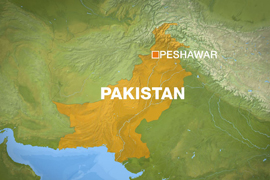Pakistan on alert after blasts
Further attacks feared as military continues its offensive in Swat valley.

Hakimullah Mehsud, a deputy to Baitullah Mehsud, the Pakistani Taliban chief, said that Wednesday’s suicide attack, that killed at least 27 people, “was in response to the Swat operation where innocent people have been killed”.
“I appeal to [people] of Lahore, Rawalpindi, Islamabad and Multan to vacate their cities as there will be more such massive attacks, more dangerous than this and we will target government buildings and places,” he said.
‘Sense of foreboding’
Al Jazeera’s Mike Hanna, reporting from Islamabad, said that the capital had been on “red alert” for a number of weeks, but that warning had now been spread to other cities.
“These type of attacks were expected, they have not come as a surprise to the public or the government,” he said.
| In depth |
|
|
“There are attacks in the north and the south of the country, there are different kinds of attack, and all of this has immense impact on a public that to-date has been utterly supportive of the government in its ongoing offensive in the Swat valley.”
On Friday, the residents of Peshawar said that people were afraid to leave their houses because of the fear of more violence.
“Things have come to such a pass that from morning till evening there is a sense of foreboding,” Shah Gul, a shopkeeper, said.
“When a person leaves his house in the morning, his wife, his sister, his parents are not sure if he will return in the evening.”
Thursday’s attacks began with two explosions in a market in Peshawar. Armed men on rooftops fired at policemen as they arrived in the narrow lanes below.
At least 70 people were injured in the two blasts.
Shortly after, a suicide bomber attacked a checkpoint on the outskirts of the city, killing a police officer and a civilian and injuring 15 others.
In addition to the fatalities, the suicide attack on a police checkpoint in Dera Ismail Khan left 13 people wounded.
Military offensive
Some people criticised the government for launching its military offensive to drive the Taliban out of the Swat valley, Lower Dir and Buner districts.
“Our rulers should get some sense into their heads and change their policies,” Mohammad Ishfaq, a local businessman, said.
“They are sitting in their palaces while poor people are dying in the streets. What is their fault.”
Tasneem Quresh, Pakistan’s interior minister, told reporters that the battle against the Taliban would continue.
“We cannot have any compromise with those who are against the solidarity and security of the country,’ he said shortly after the Peshawar attacks.
About 15,000 Pakistani troops are battling up to 2,000 Taliban fighters in the Swat valley, the military says. More than 1,200 Taliban fighters have been killed, it says.
‘Long haul’
On Friday, the military claimed it had cleared another area previously controlled by the Taliban.
 |
“Security forces continued with cordon and search operation and successfully cleared the stronghold of miscreants at Peochar village,” the military said in a statement.
Earlier this month, commandos were flown into the area, which is said to a stronghold of Maulana Fazlullah, a pro-Taliban leader with a $62,000 reward out for his capture.
Ayaz Amir, a columnist at The News, a Pakistani newspaper, told Al Jazeera: “I think most people realise this is not going to be a short war. Pakistan and the army are in it for the long haul.
“Even ordinary people on the street realise it as well and if they needed any more evidence, they could look to the large number of refugees who have come from different areas.
“People also realise how bad the situation is. I mean, what is the alternative? There are none.”

